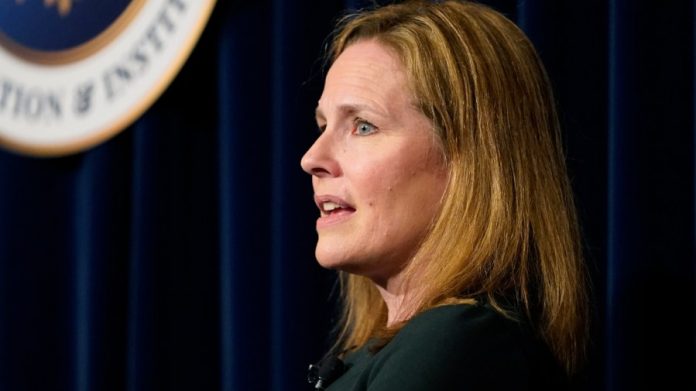
CHICAGO — Justice Amy Coney Barrett on Monday lauded “collegiality” in the legal profession, hailing it as what lets the judicial system work well despite its inherently combative nature.
She said she’s been “thinking a lot lately” about getting along and bridging disagreements.
“It occurs to me that law is a profession that, unlike some others, operates continually through the strain of disagreement,” Barrett said. “Doctors cooperate and coordinate to deal with patients. Engineers work together to build the bridge.
“But litigants and their lawyers are pitted against one another on opposite sides of the ‘V,’” she continued.
Her brief remarks came at the judicial conference for the U.S. Court of Appeals for the 7th Circuit, which covers federal courts in Illinois, Indiana and Wisconsin.
She said the legal system relies on “zealous advocacy and professionalism, and careful and fair adjudication.”
Following President Trump’s return to the White House, Barrett faced unrelenting criticism from his political base after ruling against his administration in several emergency cases. His supporters accused her of turning on the president who put her on the high court.
However, she landed back in MAGA’s good graces after authoring the majority decision in Trump’s birthright citizenship case that curtailed nationwide injunctions, a key tool used by judges to halt the president’s sweeping agenda.
In that ruling, Barrett also issued a rare smackdown of Justice Ketanji Brown Jackson’s dissenting opinion that ripped the majority’s decision as an “existential threat to the rule of law,” earning her additional praise from the president’s supporters.
The opinion marked a high-profile assignment for Barrett, making her the face of the Trump administration’s major victory.
Several justices have made notable remarks at judicial conferences in recent months, invited to speak at the event corresponding with the circuit they oversee.
In Missouri last month, Justice Brett Kavanaugh defended the Supreme Court’s sometimes-sparse emergency rulings at the U.S. Court of Appeals for the 8th Circuit’s judicial conference. He described the risk of a “lock-in effect” on the court by showing its cards too soon, suggesting those might not reflect the justices’ final view.
Earlier last month, Justice Elena Kagan had urged the court to explain itself better in emergency rulings at the California judicial conference for the U.S. Court of Appeals for the 9th Circuit.
Barrett on Monday thanked the judges and lawyers in the crowd for their “camaraderie and professionalism.”
“I think there is an upside to all of the professional hours that lawyers spend in disagreement,” Barrett said. “We not only do it well…but we also know how to do it without letting it consume relationships.
“When I look around this room, when I think about the lawyers I know in the 7th Circuit, I’m grateful for the way that our bar conducts itself,” she added. “Because that is what enables the judicial system to work well.”

